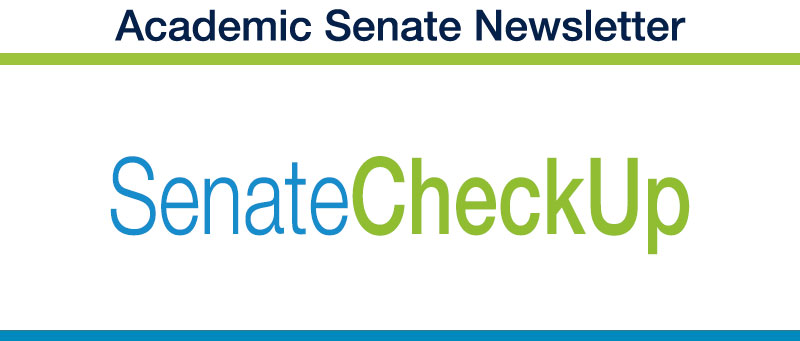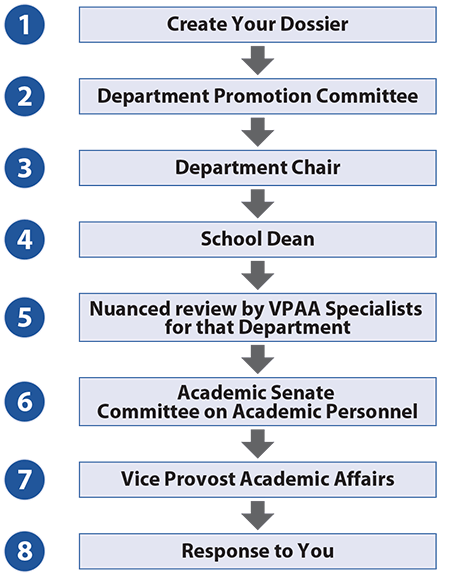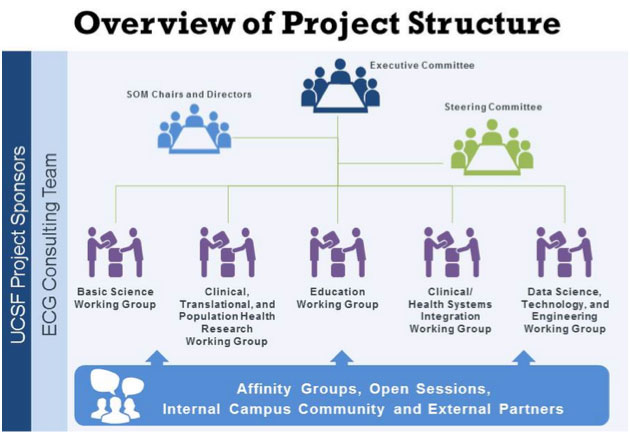 |
| September 2025 - Issue 15 |
| May 2025 - Issue 14 |
| March 2025 - Issue 13 |
| Winter 2024 - Issue 12 |
| Fall 2024 - Issue 11 |
| Fall 2024 - Issue 10 |
| Spring 2023 - Issue 9 |
| Fall 2022 - Issue 8 |
| Summer 2021 - Issue 7 |
| Spring 2020 - Issue 6 |
| Summer 2019 - Issue 5 |
| February 2019 - Issue 4 |
| September 2018 - Issue 3 |
| March 2018 - Issue 2 |
| November 2017 - Issue 1 |
| Introduction |
March 2018 - Issue 2
Message from the Academic Senate Chair
Happy Pi Day!
For all of you who are like me, it’s a great pleasure when procrastination actually works. You may note that there are only seven days left for the Winter Newsletter to be delivered in its appropriate season, but by a brilliant set of delaying tactics (aka, procrastination), I was able to ensure that the Winter Slice of Pie Newsletter would be delivered on March 14, or Pi Day.
The history of Pi Day is, I’m happy to say, all San Francisco. In 1988, at a retreat in Monterey, Larry Shaw, listed as the “former staff physicist, tinkerer and media specialist” at the Exploratorium’s website, came up with the notion of celebrating Pi Day, by noting that the numeric representation of March 14 is 3.14 (it would have been even more apt had the first Pi day been in 2015, or perhaps 2016, for those who like to round up). Particularly noteworthy is that March 14 is also Albert Einstein’s birthday. At the Exploratorium’s annual Pi Day event since 1988, Larry, as the Prince of Pi, has led the Pi parades. Sadly, he died in 2017, so the parade will need a new prince this year. To check out the Pi Day events at the Exploratorium, visit their 2018 Pi Day calendar.
Pi Day became a national holiday in 2009 (HR 221 – a non-binding resolution), and it is now celebrated by institutions, mathematicians, and pi(e) lovers around the world. Not surprisingly, MIT, in a fit of nerdiness, now sends out its acceptances on Pi day at Tau time (March 14 at 6:28 pm).
What is Tau? To find out, go to this wonderful video on the MIT website. And, after viewing it, do email me at [email protected] to tell me whether you remain a Pi loyalist or have become a Tau convert. I’ll post the results on Tau Day…
Enough of pi, what about pie? My choice for this newsletter is also all San Francisco. After a grueling few months of testing pies throughout the Bay Area (someone has to do it), the Salty Honey Walnut pie from Three Babes Bakeshop wins:
Three Babes Bakeshop describes itself as a women-owned, minority-owned organic pie business in San Francisco. Careful investigative research on my part has uncovered, as they shamelessly admit, that there are currently only two babes, Anna and Lenore, who run this wonderful pie-nterprise. For those interested, they are looking for a third babe...

And if you have become a Tau-ist after watching the video, you will need to buy a second pie. You have lots to choose from, but I recommend the Blackberry Crumble.
Lastly, I want to make a few important announcements:
- Nominations for the UCSF Medal: The UCSF Medal is the University's highest honor, celebrating extraordinary individuals for their achievements. Nominations are being accepted through March 30, 2018. To submit a nomination, contact Maureen Gomes.
- For those who, like me, loved the Black Panther, do be aware of the havoc that superheroes wreak on the environment. Bummer, eh. But I’m guessing that vibranium somehow absorbs all of the calories/CO2/heat produced and re-normalizes things – so don’t fret too much.
- Another prop for bicycle commuting (and my daughter, who alerted me to this article)! For those of us who are lifelong cyclists, the hazards that are the streets of San Francisco may be worth it, according to this study published in Aging Cell this week (Duggal NA, Pollock RD, Lazarus NR, Harridge S, Lord JM. Major features of immunesenescence, including reduced thymic output, are ameliorated by high levels of physical activity in adulthood. Aging Cell. 2018). It showed that cyclists over the age of 55 who regularly cycled had higher levels of young, naive T-cells and recent thymic emigrants (RTE), and that RTE frequency was no different to young adults. Immunesenescence, be gone!
Enjoy Pi Day, pies with your coffee, and the newsletter articles.
David Teitel, MD, Chair
Academic Senate (2017-2019)
CAP: Where’s My File?
The UC San Francisco Division of the Academic Senate’s Committee on Academic Personnel (CAP) makes recommendations to the Vice Provost of Academic Affairs (VPAA) concerning appointments, advancements, reviews, policy, and related matters. The Committee works in partnership with the Academic Affairs Office and provides weekly reports to the VPAA on matters related to faculty file actions. CAP’s membership includes representatives from all Schools, and from as many different series UCSF sites as is feasible.
Since 2011, the ADVANCE System has allowed faculty to track their file through the advancement and promotion process. Nonetheless, the question most often heard by the Academic Senate Office from faculty is: “CAP: Where is my file?”
Because ADVANCE gives faculty the ability to track their packet, the Academic Senate Office sees these queries as a concern about the length of the advancement and promotion (AP) process rather than the actual status of a particular file. So, faculty should never have to wonder. The Senate recognizes the tendency on the part of faculty to equate the entire AP process with the CAP review, but it is only a step in the process.
The entire review process takes one year, during which the packet goes through several steps (Figure 1). Some of that time is often waiting for internal and external reference letters. Although steps 5 and 7 go through the same office, different activities are done during these two steps. Step 5 involves a nuanced review of the file by an Academic Affairs Specialist in the VPAA unit assigned to that Department. This Specialist scrutinizes the file to ensure that all requirements are met, so that, when the file is sent on to CAP, it is not returned with a request for more information. Each VPAA Specialist manages the files of faculty from 10-15 Departments or Divisions.
Step 6 is the review by CAP. As CAP is designed to be an independent body in the review process, it has no knowledge about the status of a file from the review at steps 2-5. This is one of the reasons that ADVANCE was designed to allow faculty to determine the file’s status themselves.
Figure 1

It takes approximately six to seven weeks between the arrival of the file in the CAP queue in ADVANCE, to its return to the Academic Affairs Office through ADVANCE. This is a slight increase from the historical four to six week turnaround, and represents expansion of the UCSF faculty in addition to partnerships with several new affiliates. CAP members review files on a first-come-first-serve basis unless requested otherwise by the Academic Affairs Office. It considers between twelve to fifteen files per week. The revamp of the ADVANCE System in recent years, including the creation of the educator portfolio, has made files coming through to CAP more uniform in content and presentation. This has contributed to an increase in the volume of files reviewed at each weekly CAP meeting, mitigating the effect of the large increase in files reviewed.
Step 7 is the final review by Brian Alldredge, PharmD, Vice Provost for Academic Affairs (VPAA). Upon completion, the file is returned to faculty.
Overview of the PMAP Online Module
To aid faculty in understanding the AP process for their respective series, a group of former CAP members worked with the Academic Senate Office to develop a personalized online educational module for faculty, which launched in spring 2017. The Personalized Mentoring Advancement Promotion Module, also known as PMAP for short, was designed for faculty in partnership with the VPAA and Associate Deans of Academic Affairs from each of the four schools. PMAP is accessed through the MyAccess portal. The module is separate from ADVANCE, but should be used in conjunction with it when faculty members compile their packet in preparation for an upcoming personnel action.
The online module includes nine tabs. The information within it will change as a faculty member advances in rank. It also includes information related to changes in series, and what qualifies as an acceleration. Specific examples of contributions toward diversity in all faculty series are also emphasized within the module. CAP looks for such information in each faculty file that they review, whether in the form of a diversity statement, or as part of teaching, mentoring, or University or public service.
Gathering Feedback on the PMAP Online Module
PMAP reflects the Senate’s intention to support faculty advancement in the ever-increasing pace and environment of UCSF.
Outreach presentations and module demonstrations can be arranged for upcoming Town Halls or Departmental or School Faculty Meetings. If faculty are interested in having such a meeting at their own Division or Department meeting, they can reach out to the Senate office to request one. Now that the module is live, faculty can give feedback through the module itself. The PMAP Advisory Council, which is made up of former CAP members who created the module, recommends that faculty look over the module one year prior to submitting a packet.
While the Senate staff does not typically undertake initiatives like PMAP, current and former members of CAP chose to use their portion of the Senate’s Chancellor’s Funds to develop these modules, which we hope will assist the faculty in understanding the AP process and creating the best advancement packet.
The Senate Drives Chancellor’s Fund Initiatives
The UC San Francisco Division of the Academic Senate receives $500K annually to support faculty life, primarily through small individual and group grants. Known on campus as the Senate’s Chancellor’s Funds or the Faculty Academic Renewal (FAR) Funds, these funds began in 2014 and are promised through to 2024. Each grant, however, is for one year.
Since the inception of the Senate’s Chancellor’s Fund, the Senate has also undertaken a variety of campus-wide initiatives to benefit as many faculty as possible. At least one Senate Committee, often in conjunction with another entity, sponsors each initiative. Some examples include:
Clinical Faculty Leadership Express (C-FLEX) is a new development pilot program. It was created during the 2016-2017 school year, for leadership training of clinical faculty with a minimum of five years’ experience. It was designed by a partnership between the Clinical Affairs Committee (CAC) and the Healthforce Center at UCSF. This year, C-FLEX was renamed to FLEX, which will include all faculty, not just those in a clinical series.
The Personalized Mentoring Advancement Promotion Module, also known as PMAP for short, was designed to aid faculty in understanding the advancement and promotion (AP) process specific to their rank and series. A group of former Committee on Academic Personnel (CAP) members worked with various offices, including Academic Affairs, and each school’s Associate Deans of Academic Affairs to develop the personalized online educational module for faculty, which launched in spring 2017.
Committee on Library & Scholarly Communication (COLASC) has advocated for Open Access (OA) funding over the years. OA policies support faculty members to retain ownership of their scholarly work, and make their work freely available to other researchers and the public at large.
The Committee on Equal Opportunity (EQOP), in collaboration with the Campus Council on Faculty Life (CCFL) sponsors faculty participation in the National Center for Faculty Diversity and Development (NFCDD) Faculty Success Boot Camp, which aims to help faculty increase their research productivity, improve their time management, and balance their personal and professional life.
While the Senate does not typically undertake campus-wide initiatives, it considers these type of projects as representing a natural extension of Senate activities in assisting all faculty in realizing the mission of UCSF.
Funding provided through four pathways
The Senate promotes awareness of its Chancellor’s Fund, allocates the funds through a process overseen by various Senate committees, and distributes the funds. The individual and group grants fall into four pathways:
- faculty learning and development
- faculty enrichment/needs
- travel grants – both education curriculum-focused, and research-related
- community service and volunteering
Faculty in any academic series who have a minimum 50% appointment are eligible to apply, except for faculty without salary, specialists, or professional research series. The call for applications goes out each January. To apply for a grant one of the pathways, faculty should review the specific submission rules for each application on the Senate website.
Faculty learning and development
The faculty learning and development fund is for faculty within all Schools and is sponsored by their respective Faculty Councils.
Development activities funded by this pathway include, but are not limited to, academic and training courses, conferences, external professional development consultation, formal training courses to improve teaching or to develop new professional skills, and leadership development programs.
Applicants can apply individually or in groups. Two examples of group funding from past recipients are: a team of five formed a Faculty Affiliate Program for faculty involved in global health, which led to live-streamed lectures and collaborative lunches. Another example was a request to fund diversity training for the School of Nursing (SON), which helped faculty dig deeper into issues of equity and inclusion.
Schools also have their own matching funds, which raises the award range to $2,000-$5,000, depending on the specific school. It is required that awardees disseminate the information they have acquired with their colleagues in a written format or presentation.
A past recipient of the faculty learning and development fund and the research grant for mid-level faculty is Snehlata Oberoi, BDS, DDS, MDS, professor of orofacial sciences in the School of Dentistry. Oberoi said she is thankful that the Senate has identified this need to support faculty who have dedicated themselves to an academic career.
“These funds are instrumental in faculty development and have allowed me to attend conferences and present my research and network with colleagues from all over the world,” Professor Oberoi said. “I have much gratitude for the ongoing support I receive as a faculty member of UCSF.”
Faculty enrichment/needs
The faculty enrichment/needs fund is intended to support activities, items, or services that enhance one’s work-life, or well-being at work. This fund also helps provide faculty with supplies and services they cannot attain through any other source. The Committee on Faculty Welfare (CFW) sponsors this award. Some of the activities the fund supports are hiring a public relations consultant, hiring a professional leadership coach, hosting scientific speakers, supporting a quarterly journal club, funding software purchases, whiteboard supply and installation, and obtaining 3-D models of body parts to aid in surgery training.
Travel grants
There are two types of travel grants, educational curriculum, and research. Each has different requirements.
Grants for educational curriculum are funds to help faculty attend conferences, learned society meetings, and meetings where they present educational studies. The Committee on Educational Policy (CEP) sponsors this grant.
Grants for research are for mid-level faculty, helping faculty to attend conferences, learned society meetings, and meetings where they present research studies. The Committee on Research (COR) sponsors this grant.
A recipient of this year’s travel grant for research is Jean Nakamura, MD, associate professor of radiation oncology in the School of Medicine (SOM). Nakamura’s grant will allow her to attend an international conference in Europe on precision medicine and cancer genomics.
“This conference will include a large number of world leaders in multiple areas of precision medicine,” Professor Nakamura said. “Attending this international conference is a truly invaluable opportunity to present our research, engage with these investigators, and learn how precision medicine is being implemented at top peer institutions around the world.”
Community service and volunteering
The community service and volunteering funds are new as of this spring. They provide individual awards to faculty for various purchases related to community volunteerism. The Committee on Rules & Jurisdiction (R&J) sponsors this award. This fund was begun because of the many natural disasters that have occurred in the country over the past year, including the Northern California fires. The Academic Senate wishes to support community service as a core mission of UCSF.
Further specifics on guidelines for any of the above funding pathways are available online.
School of Medicine Strategic Plan
The UC San Francisco Division of the Academic Senate represents the faculty voice on many campus matters, including providing input on strategic plans. Through the School of Medicine Faculty Council (SOM FC), the Senate is currently giving feedback on the development of the School of Medicine Strategic Plan.
The SOM Strategic Plan is a document that, according to the SOM website, “aims to engage a diverse group of stakeholders across multiple geographies who, through their work together, will set a bold vision for the coming years.”
Olivia Herbert, MBA, assistant dean and chief of staff in the School of Medicine Dean’s Office, who serves on the SOM Strategic Plan Project Team alongside Catherine Lucey, MD, executive vice dean and vice dean for education; Stephanie Belger, director of strategic initiatives in the School of Medicine Dean’s Office; and a team of five others from ECG Management Consultants, met with the senate to discuss the formation of the strategic plan.
The plan will reflect the SOM’s fourfold mission of education, research, patient care, and public service, and align with UCSF’s PRIDE values:
- Professionalism
- Respect
- Integrity
- Diversity
- Excellence
At the March 6 SOM Dean’s Forum open to all faculty, staff, and learners, SOM Dean Talmadge E. King Jr, MD, and Lucey provided an update on the current state of the SOM Strategic Plan. King said that the SOM Strategic Plan will address the future of the SOM with the ultimate goal of advancing health worldwide.
It was noted during the forum that the SOM’s Strategic Plan must align with the overall UCSF campus plans. In addition, the SOM’s plan will remain connected to and collaborate with the other UCSF entities, including UCSF Health, the other professional schools, the graduate division, and our affiliates (including Priscilla Chan and Mark Zuckerberg San Francisco General Hospital and Trauma Center, San Francisco Veterans Affairs Medical Center, and the UCSF Fresno Medical Education Program).
While it can be difficult to conceptualize all of the components, and their control points, of the many changes taking place across the campus, this article aims to describe the SOM Strategic Plan as a means of understanding strategic planning and the role of the Academic Senate in such planning.
The Senate’s role in school faculty councils
In addition to the many committees within the Senate, there are also four faculty councils, one for each school, presenting their school’s faculty input to the administration. Each faculty council advises and collaborates with the Dean’s office to ensure that the school runs smoothly, while following its vision and addressing its missions.
During a fall 2017 meeting, the SOM FC provided feedback on the SOM Strategic Plan to the SOM Dean’s office. The chair of the SOM Faculty Council, Nisha Parikh, MD, assistant adjunct professor of medicine in the Division of Cardiology, commented on the dynamic discussion that took place, which presented a broad range of faculty’s opinions on the plan. Parikh, and vice Chair Thomas Chi, MD, associate professor in residence of Urology, were then able to present those opinions at the subsequent Strategic Plan Retreats that they attended, in October and January.
In addition, the faculty council provided feedback in a meeting with Herbert in November 2017. That meeting focused on ensuring a successful and supportive work environment for all, including women and individuals from underrepresented minority groups, as part of the plan.
In order for the faculty council to incorporate opinions from the greater faculty community within SOM, Parikh said that her goal is to allow for more communication between their council and the faculty within the SOM.
“We are holding a zoom-based meeting trial to let folks know more about who we are, what we do, and some of our recent accomplishments,” Parikh said. “If this forum works, it may become a more regular means of communication between the council and faculty.”
Collaboration in the strategic planning process
The SOM FC are not the only group on campus that is providing feedback on the SOM Strategic Plan. This process has been an inclusive one, bringing together feedback through one executive committee comprised of SOM Chairs and Directors, one steering committee (26 members), five working groups (104 participants), and 15 affinity group meetings. This planning process follows the below structure:

During the Dean’s Forum, Lucey noted that they solicited input from all members of the SOM community, from entry-level employees to senior leadership, and reached out to community members as well. They spoke with students and met with a wide variety of affinity groups.
“We really sought to hear and understand where they thought UCSF was excelling and where they thought we might put more effort,” Lucey said during the Dean’s Forum.
Following the solicitation of feedback, the SOM leadership held a retreat, bringing together representatives from all of the groups who participated, asking them to provide ways to move forward. This helped identify 11 areas of strategic attention, 50 enablers, and retreat participants developed 20 additional areas. Then, these were narrowed down to five key pillars to help support a successful transformation for the SOM Strategic Plan:
- Develop and Empower Diverse Talents
- Advance and Harness Technology
- Lead Innovation and Discovery
- Establish and Sustain Meaningful, Collaborative Community Partnerships
- Transform Communications and Operations
Rolling out the Strategic Plan: timeline and implementation
A four-phase process was defined to guide the strategic plan through creation:
- Phase One- Project Plan, Strategic Priorities
- Phase Two- Engagement Activities, Environmental Assessment
- Phase Three- Plan Recommendation, Prototype and Testing
- Phase Four- Plan Completion, Operationalization
Phase one of the creation and implementation process began in September 2017, with the creation of a steering committee. Meetings of various groups were held thereafter, as described above. The goal is to have a final plan in place and ready for operationalization by the end of March 2018.
“We’ve begun to send broader community-wide communications to update our audiences with what we’ve heard and next steps and to provide information about how interested community members can engage in the process,” Herbert said.
At the Dean’s Forum, Dean King challenged stakeholders to think about the future direction of the University and SOM. He said that, while they face changes and challenges in clinical care, education, and the political landscape, they also plan to embrace the future boldly by partnering with other schools in order to leverage advancements in promoting health.
The Senate remains committed to representing faculty views throughout the development and implementation of the SOM Strategic Plan.
Created by UC Board of Regents Standing Order 105, the UC San Francisco (UCSF) Academic Senate is empowered to exercise direct control over such academic matters as admissions for degrees and curricula, which are of central importance to the University. The UCSF Division of Academic Senate provides an independent forum to discuss faculty-related campus wide academic concerns. In other areas, the Senate exercises an active advisory role. The Academic Senate works within the larger body of UCSF, a leading university dedicated to promoting health worldwide through advanced biomedical research, graduate-level education in the life sciences and health professions, and excellence in patient care.
